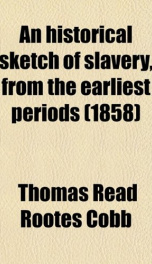an historical sketch of slavery from the earliest period

Purchase of this book includes free trial access to www.million-books.com where you can read more than a million books for free. This is an OCR edition with typos. Excerpt from book: CHAPTER SLAVERY IN GREAT BRITAIN. A Glance at the history of slavery in Great Britain must suffice us. The ocean-bound isle has not been exempt from the common fate of the nations of the world. Of the ancient Britons and their social system but little is known. They were a simple, rude, and warlike people; "satisfied with a frugal sustenance and avoiding the luxuries of wealth.'" They were governed by a large number of petty chiefs or lords, by whom the people were not oppressed; " for," says an old writer, " it is a certain maxim, that though great nations may be upholden by power, small territories must be maintained by justice."3 In fact, they seemed unusually free, for Dion, in the Life of the Emperor Severus, says," that, in Britain, the people held the helm of government in their own power."3 Their wealth consisted of cattle, and they might almost be termed a nomadic race, their towns consisting of mere huts, temporary in their structure and occupation.4 Among such a people it is more than probable slavery, if it existed at all, was mild, and similar to that of the Jewish patriarchs. The Romans, with their invasion, introduced their system of slavery. Many of the conquered Britons wereexposed in the slave-market of Rome.1 The rule of the Saxons did not change the social system of Britain in this respect. Among no people were the orders or classes more distinctly divided. The edhiling, or nobility; Haefrilmgi, or freed slaves; and the lazzi, or slaves, were among their earliest distinctions.1 The slaves are mentioned by other names, in the ancient laws, such as theow, thrcel, men, and esne.3 There were great numbers of these slaves, being a large majority of the population. Single individuals owned large numbers. Alcuin, an Anglo-Saxon abbot, had ten thousand ...
Users who have this book
Users who want this book
What readers are saying
What do you think? Write your own comment on this book!
write a commentif you like an historical sketch of slavery from the earliest period try:
Do you want to exchange books? It’s EASY!
Get registered and find other users who want to give their favourite books to good hands!


